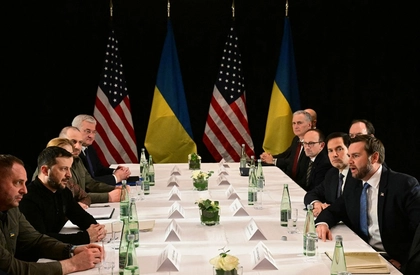Month after month, Ukrainian society has impressed observers with its seemingly unbreakable unity in the fight against the Russian invaders. But now political tensions are starting to emerge. Kyiv's mayor Vitali Klitschko has criticised President Volodymyr Zelensky in unusually harsh terms. Soldiers' wives are protesting and demanding that their husbands be allowed to take a break from the fighting on the front. And doubts about Zelensky's course are also being voiced outside Ukraine.
Irreconcilable priorities
JOIN US ON TELEGRAM
Follow our coverage of the war on the @Kyivpost_official.
Delfi is worried by the tense relations between Zelensky and his commander-in-chief Zaluzhnyi:
“Zelensky fears that a Ukrainian army that acts more defensively, and is thus less vulnerable to Russian attacks, will receive much less support from the West. ... So it's not surprising that he wants the Ukrainian army to get good results. ... Zaluzhnyi doesn't want to risk the lives of his soldiers because the existing capabilities are insufficient for an offensive. So the general and the president are both right in their own way. The problem is that their truths are hardly compatible.”
Nobody wants to tell Zelensky the truth
La Stampa believes that negotiations are the only real option and has nothing good to say about the Ukrainian president:
“Zelensky is a stubborn, dogmatic, meticulous fanatic of the myth of total victory. For him, the war can only end with Putin's capitulation. Through miraculous counter-offensives and lies about Russian agony he has convinced us that there is no other solution to the war.... No one has the political courage to tell him that absolute victory is impossible and could end in a bloodbath and defeat. ... Zelensky has also begun to see conspiracies everywhere and to suspect treachery. At the same time he has discovered that martial law is also an excellent means of eliminating those who voice criticism.”

Munich and After: An Unprincipled Mess
Russia's conditions are impracticable
After Putin's spokesman Dmitry Peskov has only putatively signalled a willingness to negotiate, former MP and blogger Borislav Bereza warns in Gordonua.com:
“Russia keeps proposing negotiations. But on its own terms, which are absolutely unacceptable for Ukraine and also impracticable. These conditions would mean the end of Ukraine and its transformation into another Belarus under Moscow's control. So reports about possible negotiations should be regarded as information noise. They mean nothing. ... Russia can promise and sign all kinds of things, but it will break its promises at the first opportunity.”
A worrying situation
In Ukrainska Pravda, Journalist Pavlo Kasarin voices concern about the political climate:
“Sometimes it feels as if the country is living in an undeclared election campaign, with unpopular resolutions passed by parliament still awaiting the president's signature. Representatives of the ruling party are publicly accusing the commander-in-chief [Valerii Zaluzhnyi] of having political ambitions. The opposition is criticising the government for denying its MPs diplomatic trips. All this suggests that Ukrainian politicians are still expecting elections - even though the president promised that they would not be held during the war. And that is a very worrying situation.”
Old feuds continue
Kyiv mayor Vitali Klitschko's harsh words about Zelensky come as no surprise for La Stampa:
“The entourage of the 'servant of the people' [Zelensky] has warned the mayor against complaining to foreign newspapers and urged him to stick to doing his job. The two have disliked each other ever since Zelensky took office four years ago and defeated his predecessor Petro Poroshenko, Klitschko's current supporter, in the elections. ... With the war, the government created municipal military administrations parallel to the normal administration and placed them under its control. From then on a game of blame and suspicion has been playing out between the centre and the periphery.”
Poroschenko not a real threat
Newssite 444.hu puzzles over why the Ukrainian border officials prevented former Ukrainian leader Poroshenko from leaving the country:
“We don't yet know why Petro Poroshenko wanted to meet Viktor Orbán. ... It is also questionable whether this new chapter in the war between Zelensky and Poroshenko has any real significance for the future of Ukraine. But it seems likely that the prevention of the trip is not unrelated to the ambitions of the country's leader and his growing sense of personal danger. ... Nonetheless, whatever he tries to do, Poroshenko is not the person to whom Ukrainians, apparently weary of the vicissitudes of war, would look for salvation.”
Zelensky's opponents are back
Radio-Kommersant FM commentator Maxim Yusin quotes what an old friend from Kyiv told him about the situation in Ukraine:
“'Politics is gradually returning to our lives,' he said. 'After the war started, there was practically none. Everyone rallied round the president. They were afraid to criticise him, and didn't want to: he was perceived as a symbol of the fighting nation. Now there is no such cohesion. The opposition has become bolder, people are beginning to openly express doubts and scepticism. And there are cracks within the presidential team.' ... The political opposition, which was previously quiet and loyal, is alive again. And above all the supporters of former president Petro Poroshenko.”
Not the time to abandon the war effort
The complicated political situation in Ukraine makes support from abroad all the more crucial, writes The Times:
“Tensions are bubbling below the surface in Kyiv, with potential rivals of President Zelensky quietly emerging. Generals who admit that the country is in stalemate are branded as defeatists. The Ukrainians are already outgunned on many fronts by Russian forces; the bombardment of civilians continues apace. Even if aid picks up, Ukraine faces a long, hard winter. This is not the time for the West to lose its collective nerve.”
You can also highlight the text and press Ctrl + Enter











